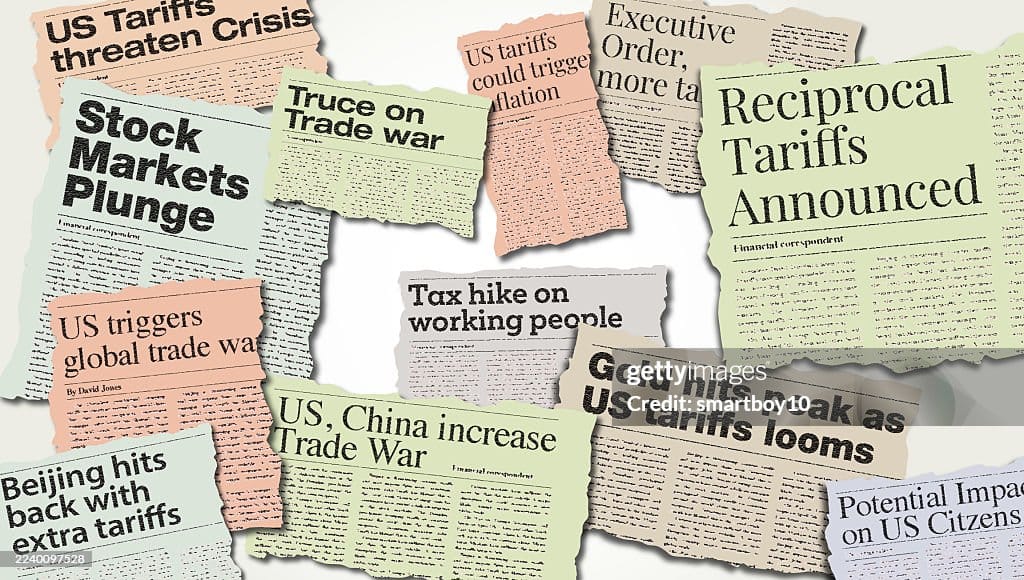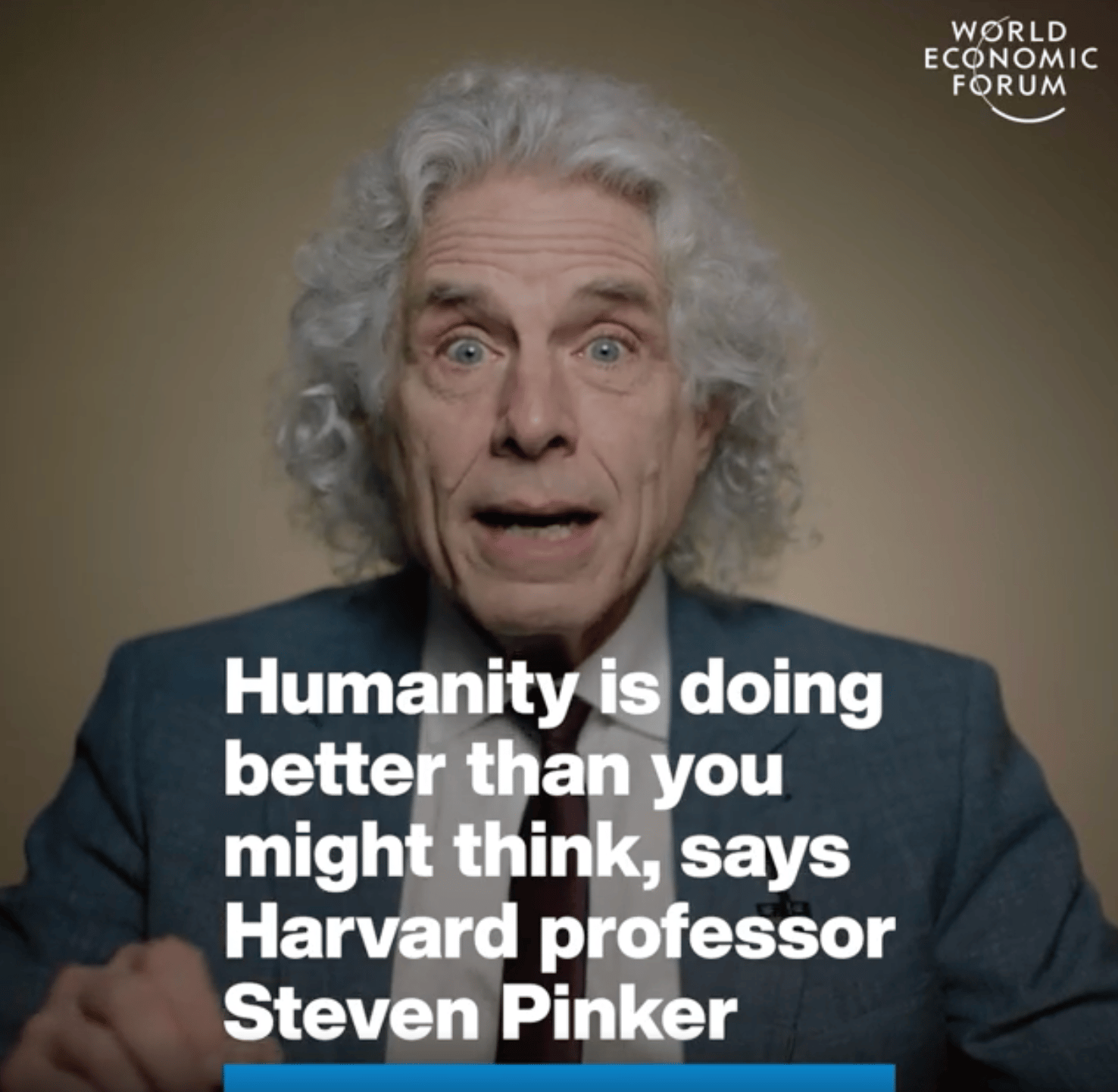- The Intersection
- Posts
- Can things get better?
Can things get better?
Why optimism, progress, and giving still matter in a world that feels heavy.
Today’s edition starts with a big question. Maybe a bit deep to start a Friday morning. But if you think about it, it can be the foundation of almost everything we do — whether you’re a leader, creator, founder, educator, or anyone working in the social impact world.
Do you believe things can get better?
Think about it in general. For you and your family? For your community? What about for our society, economy, and the world we’re passing on to the next generation?
Hold that thought. (Your answer matters).
The world is (actually) getting better — even when it doesn’t feel like it
If all we consume is breaking news alerts and doomscrolling on social media, it’s easy to feel like everything is falling apart.

But this isn’t the full story. Not even close.
Steven Pinker has spent years arguing — backed by decades of data — that humanity is far better off today than at almost any point in history.
In his TED Talk from a while ago, and books Enlightenment Now and The Better Angels of Our Nature, he points to statistics that often shock people:
Global extreme poverty has dropped from 36% in 1990 to less than 10% today.
Life expectancy has more than doubled over the last century.
Worldwide deaths from violence, wars, and homicide have sharply declined over long timelines.
Literacy rates and access to education have surged across almost every region.
It doesn’t mean everything is perfect. It means progress is real.
Even in a world full of uncertainty — economic, environmental, political — the long arc still bends toward improvement.
So why doesn’t it feel that way?
Because we feel the daily pressures — rising costs, layoffs, divisive politics, burnout, pressure to keep up, and the emotional weight of being constantly connected.
We’re wired to notice threats more than progress.
And if you work anywhere near the nonprofit sector, you’re exposed to the hardest realities every day. I’ve been around many people who wake up thinking about problems — food insecurity, housing, youth mental health, climate challenges, violence, inequity.
What I noticed about them all is that they keep showing up anyway.
Not because they’re naïve or they just “hope for the best.” It’s because they actually believe things can get better — and they choose to move the needle in that direction.
If that belief disappears, we’re in trouble.
Optimism is not delusion — it’s a practice
This is where a page from The Brave Habit stood out to me. It’s one of the books I’ve been reading off and on since last year (love that it has an accompanying workbook).
“Optimism is central to the development of better habits… the heart of optimism is the belief that every day we can create something new.”
Todd Henry writes about cultivating a mindset of optimism — not the fluffy, feel-good kind, but the grounded belief that your actions today can shape a better tomorrow.
Optimists believe that challenging circumstances are temporary, not permanent — they can do something now or in the future to make them better. (That’s me).
It’s choosing to see that challenges are temporary, not permanent. That your effort matters. Your contribution can shift something — even a little bit.
Optimism isn’t pretending everything is fine, Todd reminds us.
It’s acknowledging the difficulty and deciding it’s still worth showing up.
And that’s what giving is, at its core.
Giving is belief in action
Giving — whether it’s money, time, presence, skill, or support — is a statement of belief:
“I think this can get better.”
“I believe in this community.”
“I believe young people deserve opportunity.”
“I believe art matters.”
“I believe our city can be more equitable.”
“I believe everyone should have a chance.”
Most giving doesn’t happen because people are flush with extra money.
It happens because people believe in possibility.
If you’ve never given before, or if you’ve drifted away from it, this is your reminder:
Giving is not about how much.
It’s about what you’re agreeing to believe.
A moment to come together to give
With GivingTuesday coming up, this question feels even more relevant.
And this year, I’m supporting a local event and fundraiser.
On Tuesday, December 2, we’re bringing together artists, community builders, nonprofits, and youth programs for Create/Change, a collaborative GivingTuesday event hosted by Vengeance Foundation at Youthful Vengeance.
It’s a night of art, creativity, and shared purpose — supporting organizations focused on youth, arts, STEM, and community building, including.
It’s collaborative. It’s community-powered. It’s rooted in the belief that things can get better — especially when we act together.
If you’ve never given before, this is a meaningful place to start (even if you’re not in Toronto). If you already give to large organizations, this is a moment to lean in and support local.
What’s next?
I’ll ask what I asked at the beginning:
Do you believe things can get better?
If your answer is “yes,” even a hesitant yes, then I encourage you to act like it.
Let’s support the people and organizations working every day to move us toward that future.
Let’s choose optimism, not as a mood, but as a practice.
And let’s build the world we wish someone had handed to us.
Where have you seen progress, even subtle progress, in your world lately?
Let me know…
This Week’s Video
Which content do you trust these days? I made a video about 4 things to be aware of if you're building a community, career or brand. Prefer to read instead? I wrote out a more detailed version of this here.

